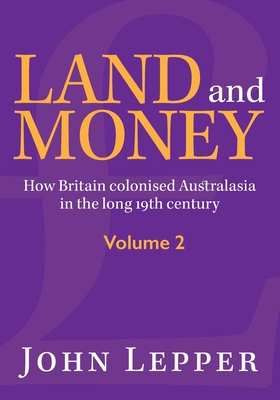Land and Money Volume 2: How Britain colonised Australasia in the long 19th century

Land and Money Volume 2: How Britain colonised Australasia in the long 19th century
1. Sequestration of Land in New Zealand
2. New Zealand Embraces a Land Market
3. Emerging Monetary Systems
4. Secondary Market in Land
5. Land Companies
6. Land Politics
7. Australasian Monetary System Before World War 1
8. Prosperous Servitude
John Lepper closes his two-volume, 130-year examination in 1914 here. He exposes the colonial creation myth - unused resources made productive by sturdy independent settlers who love the Crown and live in places of harmony and progress. The myth was designed, Lepper writes, because no-one wanted to frighten London's risk-averse lenders into raising interest rates on governments' debts. The Antipodean idea of order was to maintain the supply of money at low interest rates.
The commodification of land became vital to allay debtor governments' fears. Lepper picks up tht journey through the individualisation of land title, how colonial rebellion was punished and seen to be so, and, locally, how opportunity knocked to get more land to make more money ... London banks in the 1860s started to make their own way and own pace. Australians and New Zealanders joined the International Monetary System. Good credit made Melbourne 'Marvellous' and Dunedin a wee bit grand. The 1890s 'bust' was the nations' first international depression.
So 'Prosperous Servitude', Lepper's term, is us in 1914.
PRP: 289.25 Lei
Acesta este Pretul Recomandat de Producator. Pretul de vanzare al produsului este afisat mai jos.
245.86Lei
245.86Lei
289.25 LeiLivrare in 2-4 saptamani
Descrierea produsului
1. Sequestration of Land in New Zealand
2. New Zealand Embraces a Land Market
3. Emerging Monetary Systems
4. Secondary Market in Land
5. Land Companies
6. Land Politics
7. Australasian Monetary System Before World War 1
8. Prosperous Servitude
John Lepper closes his two-volume, 130-year examination in 1914 here. He exposes the colonial creation myth - unused resources made productive by sturdy independent settlers who love the Crown and live in places of harmony and progress. The myth was designed, Lepper writes, because no-one wanted to frighten London's risk-averse lenders into raising interest rates on governments' debts. The Antipodean idea of order was to maintain the supply of money at low interest rates.
The commodification of land became vital to allay debtor governments' fears. Lepper picks up tht journey through the individualisation of land title, how colonial rebellion was punished and seen to be so, and, locally, how opportunity knocked to get more land to make more money ... London banks in the 1860s started to make their own way and own pace. Australians and New Zealanders joined the International Monetary System. Good credit made Melbourne 'Marvellous' and Dunedin a wee bit grand. The 1890s 'bust' was the nations' first international depression.
So 'Prosperous Servitude', Lepper's term, is us in 1914.
Detaliile produsului









